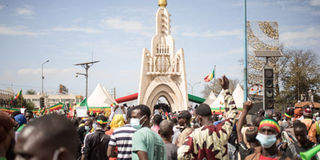Malians out in force after junta calls protests over sanctions

A crowd climbs the Independence Monument, the focal point of events in Bamako during a mass demonstration in Bamako, on January 14, 2022, to protest against sanctions imposed on Mali and the Junta by the Economic Community of West African States (ECOWAS). PHOTO/ AFP
What you need to know:
- In the capital Bamako, thousands of people wearing the national colours of red, yellow and green gathered in a central square, for a rally staged by the military government, and sang patriotic songs.
Malians took to the streets on Friday after the military junta called for protests against stringent sanctions imposed by the West Africa bloc ECOWAS over delayed elections.
In the capital Bamako, thousands of people wearing the national colours of red, yellow and green gathered in a central square, for a rally staged by the military government, and sang patriotic songs.
A large crowd also gathered in the northern city of Timbuktu, AFP correspondents reported. Social media also showed mass demonstrations in the towns of Kadiolo and Bougouni in the south.
Leaders from the Economic Community of West Africa States (ECOWAS) agreed to sanction Mali last week, imposing a trade embargo and shutting borders, in a decision later backed by the United States, the European Union and former colonial power France.
The move followed a proposal by Mali's junta to stay in power for up to five years before staging elections -- despite international demands that it respect a promise to hold the vote in February.
The junta cast the sanctions as "extreme" and "inhumane" and called for demonstrations.
Strongman Colonel Assimi Goita, who first took power in a coup in August 2020, has also urged Malians to "defend our homeland".
On Friday, his office said the interim government had developed a "response plan" to the potentially crippling sanctions, without specifying details.
It added that the government remained open to dialogue with regional institutions and did not intend to engage in "arm-wrestling".
'Cut off'
Senior government figures attended the Bamako rally and were applauded by the crowd.
Nouhoum Sarr, a member of Mali's transitional legislature, said "our country will be saved and liberated by the Malian army and the entire Malian people".
"Long live Assimi," said Abdoulaye Yanoga, a 27-year-old unemployed man at the rally, referring to Mali's leader. "These sanctions will not succeed here".
As well as closing borders and imposing a trade embargo, ECOWAS leaders also halted financial aid to Mali and froze the country's assets at the Central Bank of West African States.
The sanctions threaten to damage an already vulnerable economy in landlocked Mali, one of the world's poorest countries.
A brutal jihadist insurgency has raged in Mali since 2012, with swathes of the vast country's territory lying outside of government control.
Mali is already beginning to feel the effects of the sanctions. Several airlines, including Air France, have suspended flights to Bamako.
The country is also at risk of cash shortages. Kako Nubukpo, a commissioner at the West African Economic and Monetary Union, said that it is "cut off from the rest of the world".
- 'Safe enough to vote' -
France, Mali's former colonial master, and the United States have both stated their support for the ECOWAS sanctions.
EU foreign policy chief Josep Borrel said on Thursday that Brussels will follow ECOWAS in taking action against Mali over the delayed elections.
The same day, United Nations Secretary-General Antonio Guterres said it is "absolutely essential that the government of Mali present an acceptable election timetable".
Despite the pressure, many in Mali have rallied behind the military junta, with nationalist messages flooding social media.
Mali's relations with its neighbours and partners have steadily deteriorated since the coup led by Goita in August 2020 against president Ibrahim Boubacar Keita.
Under threat of sanctions following that putsch, Goita had promised to hold presidential and legislative elections, and to restore civilian rule, by February 2022.
But he staged a de facto second coup in May 2021, forcing out an interim civilian government and disrupting the timetable for the restoration of democracy.
Goita also declared himself interim president.
His government has argued that rampant insecurity in Mali prevents it from organising safe elections by the end of February.
The mass protest turnout on Friday drew comment from French Foreign Minister Jean-Yves Le Drian.
"If it's safe enough to demonstrate, surely it is safe enough to vote," he said as EU foreign ministers met in Brest, northwestern France.
France has thousands of troops in Mali and neighbouring Sahel countries in west Africa as part of an anti-jihadist force.
"We're in Mali and we're staying, but not under any conditions," Le Drian said.





